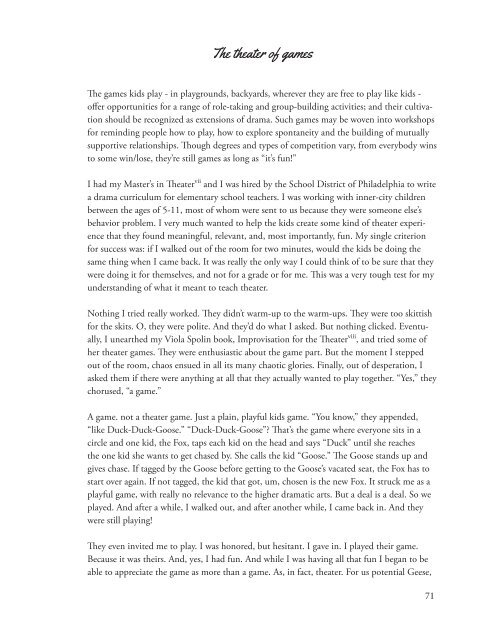A-Playful-Path_DeKoven-web
A-Playful-Path_DeKoven-web
A-Playful-Path_DeKoven-web
You also want an ePaper? Increase the reach of your titles
YUMPU automatically turns print PDFs into web optimized ePapers that Google loves.
The theater of games<br />
The games kids play - in playgrounds, backyards, wherever they are free to play like kids -<br />
offer opportunities for a range of role-taking and group-building activities; and their cultivation<br />
should be recognized as extensions of drama. Such games may be woven into workshops<br />
for reminding people how to play, how to explore spontaneity and the building of mutually<br />
supportive relationships. Though degrees and types of competition vary, from everybody wins<br />
to some win/lose, they’re still games as long as “it’s fun!”<br />
I had my Master’s in Theater vii and I was hired by the School District of Philadelphia to write<br />
a drama curriculum for elementary school teachers. I was working with inner-city children<br />
between the ages of 5-11, most of whom were sent to us because they were someone else’s<br />
behavior problem. I very much wanted to help the kids create some kind of theater experience<br />
that they found meaningful, relevant, and, most importantly, fun. My single criterion<br />
for success was: if I walked out of the room for two minutes, would the kids be doing the<br />
same thing when I came back. It was really the only way I could think of to be sure that they<br />
were doing it for themselves, and not for a grade or for me. This was a very tough test for my<br />
understanding of what it meant to teach theater.<br />
Nothing I tried really worked. They didn’t warm-up to the warm-ups. They were too skittish<br />
for the skits. O, they were polite. And they’d do what I asked. But nothing clicked. Eventually,<br />
I unearthed my Viola Spolin book, Improvisation for the Theater viii , and tried some of<br />
her theater games. They were enthusiastic about the game part. But the moment I stepped<br />
out of the room, chaos ensued in all its many chaotic glories. Finally, out of desperation, I<br />
asked them if there were anything at all that they actually wanted to play together. “Yes,” they<br />
chorused, “a game.”<br />
A game. not a theater game. Just a plain, playful kids game. “You know,” they appended,<br />
“like Duck-Duck-Goose.” “Duck-Duck-Goose”? That’s the game where everyone sits in a<br />
circle and one kid, the Fox, taps each kid on the head and says “Duck” until she reaches<br />
the one kid she wants to get chased by. She calls the kid “Goose.” The Goose stands up and<br />
gives chase. If tagged by the Goose before getting to the Goose’s vacated seat, the Fox has to<br />
start over again. If not tagged, the kid that got, um, chosen is the new Fox. It struck me as a<br />
playful game, with really no relevance to the higher dramatic arts. But a deal is a deal. So we<br />
played. And after a while, I walked out, and after another while, I came back in. And they<br />
were still playing!<br />
They even invited me to play. I was honored, but hesitant. I gave in. I played their game.<br />
Because it was theirs. And, yes, I had fun. And while I was having all that fun I began to be<br />
able to appreciate the game as more than a game. As, in fact, theater. For us potential Geese,<br />
71


